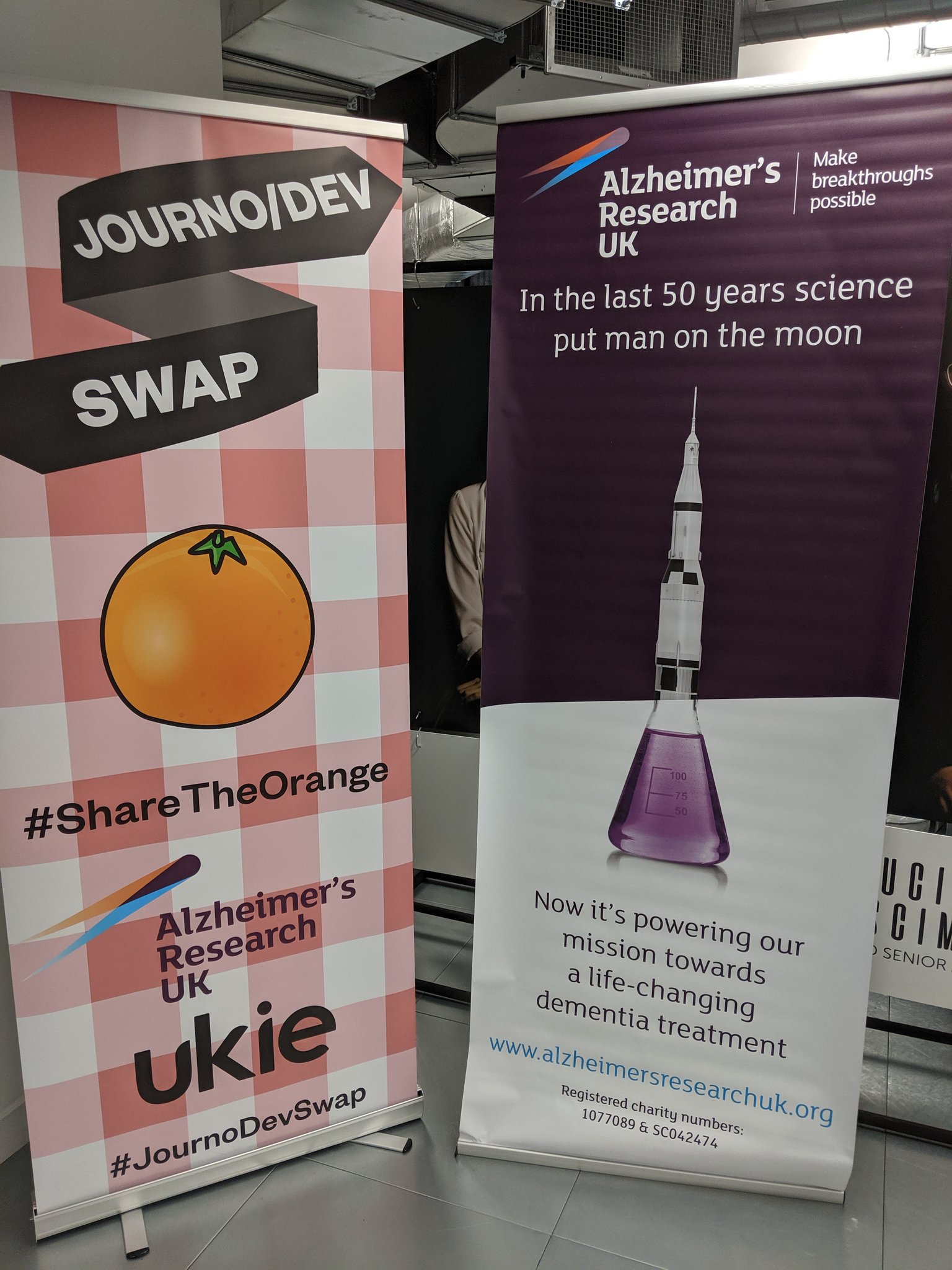A few weeks ago here at Ukie we hosted the ‘Journo/Dev Swap’; a rather special game jam that approached things a little differently. Having had a chance to reflect – and perhaps recover – it’s time to ponder the value of the three-day game-making session.
The jam was essentially an exercise in empathy, as well as learning by stepping out of comfort zones. We asked game developers to cover the jam as press, writing to real deadlines for publication on GamesIndustry.biz, which hosted their articles. Meanwhile, games press made the games to a theme, supported by student game developers.
And we had the support of Alzheimer’s Research UK, which provided a theme to focus our press-turned-developers. The theme was ‘the brain’, with the jam taking place on the closing weekend of World Alzheimer’s Month, and coinciding with the charity’s brilliant #ShareTheOrange initiative.
Alzheimer’s Research UK have already worked with games as a means to engage the public with considering the reality of the fight to overcome Dementia – and even help with research. Partnering with UK studio Glitchers and Deutsche Telekom, for example, Alzheimer’s Research UK previously released Sea Hero Quest; the first consumer VR game which lets players help scientists fight dementia. Remarkably, playing for just two minutes results in the equivalent of five hours of lab-based research.
Back at the Journo/Dev Swap game jam, the theme of ‘the brain’ was specifically selected so as to offer those attending the chance to explore issues and challenges around dementia, while also leaving them free to interpret things without even touching on the disease. Interestingly, most went with the former.

The jam offered Alzheimer’s Research UK a chance to explore how they might work with the gaming industry, medium and creative process to further the charity’s efforts to harness the power of the medium to engage. And we can’t thank them enough for embracing the slightly counter-intuitive idea of letting non-game devs make games.
That idea actually came from the original Journo/Dev Swap game jam, which game developer and consultant Will Luton came up with, organised and ran, with Ukie hosting. Seven years on, the core concept was essentially the same. We just slightly updated the format to reflect a changing game industry. That means we stretched a traditional 48-hour model out over three days, avoiding the classic ‘sleeping bags in the corridor’ jam version of crunch. Same amount of dev time; just a chance to sleep and unwind.
For the devs and press involved, the idea remained broadly the same. We wanted people that write about games to try actually making one, and people that make games to get a sense of the reality as working as game press. We hoped that experience might prove helpful when it comes to going back to their day jobs. After all, even just a taste of making a game should give press a little more insight when it comes to writing about the games. And a taste of the reality and pressures of turning copy around fast should inform a game developer’s understanding of – and contact with – the journalistic process.
And just those things seemed to happen. From the off the feeling in the room was energising and exciting. Our ‘role swappers’ were certainly a little nervous at first, but it quickly became apparent all our press fell for the process of making a game. Thanks to accessible game tools – we used Unity – and the efforts of our devoted student devs, our press became besotted by the notion that they in fact could make games, and enjoy the experience of doing so. As the jam neared its deadline the excitement and energy built and built, and all the games were finished – and even a little polished – in plenty of time.

As for the devs-turned press? You can read their coverage from day one, day two and day three to see what they made of it. Interestingly, many of them explored the theme of what it was like to take on a press role; and see non-devs make games.
Ultimately, the Journo/Dev Swap game jam was a great success, and in equal parts fun, thought provoking and meaningful. We’ve already had outreach from people in the Iranian and Maltese game industries keen to replicate the jam in some way. And one of our jammers, the prolific TV and radio presenter, live host and vlogger Julia Hardy, has concocted the brilliant idea of the ‘Slow Jam’; a regular evening meet up of game press so they can make games with student devs. Doing so should continue the spirit of Journo/Dev Swap, while letting games be made at a slightly more relaxed, less intense way. And volunteering students will have a chance to build both portfolio and contacts. The details are yet to be down, but we hope to help make it a reality.
It certainly feels like the Journo/Dev Swap jam wants to live on in some way. And who knows? Maybe it won’t be another seven years until the next one?

Finally, congratulations to the winners; the leading game journalist and presenter Alysia Judge, and her superb student collaborator Saul Barrere. It was a close result in the end. Also, thanks so much to Alzheimer’s Research UK, all the wonderful students, Unity, our panel of expert judges, developer Byron Atkinson-Jones (who served as a Unity expert available to guide teams facing complex technical challenges), the organising team, the game industry legends that dropped by to share advice and encouragement, and the friends and family that visited to support their loved ones. You were all essential to the jam being everything we hoped for and more!
Authored and Game Jam organisor: Will Freeman

